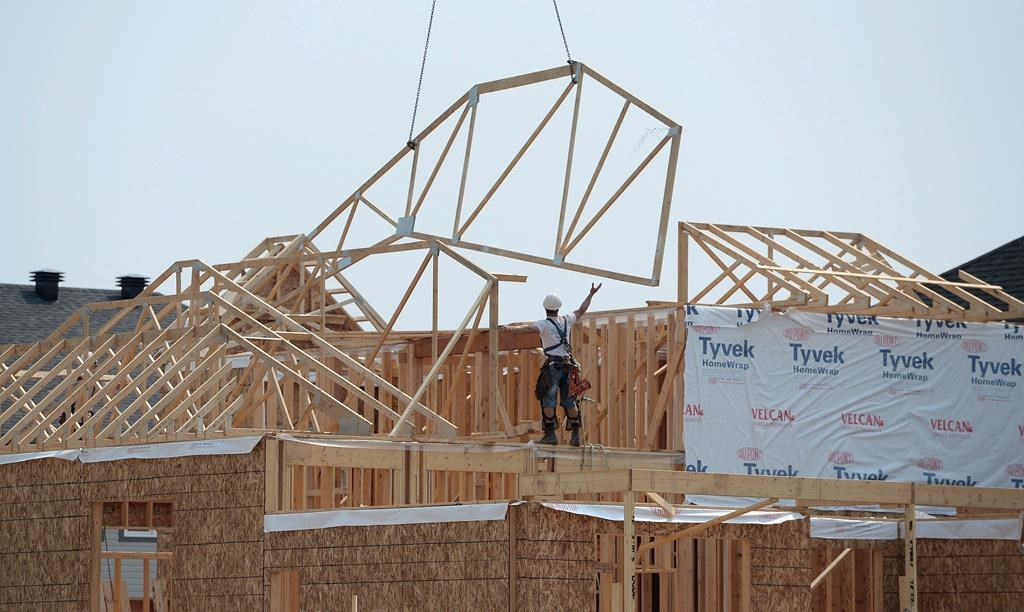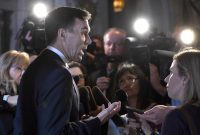Support strong Canadian climate journalism for 2025
Canada’s big-city mayors say they’re facing a funding bottleneck on big-ticket infrastructure projects like public transit, and want Ottawa to push the provinces harder to get cash flowing.
They say provinces need to front money in the short term for big-ticket projects, because the federal government can only get its funding out the door once projects are built.
At talks in Ottawa on Thursday, members of the 'Big-City Mayors Caucus' said they want “signals” in the next federal budget, now less than two weeks away, for “full and fair cost-sharing to move transit and other projects forward.”
"We're not here today in this pre-budget meeting to ask for more money,” said Edmonton Mayor Don Iveson, chair of the caucus, which represents 22 of Canada's largest cities and is part of the Federation of Canadian Municipalities.
The federal government, he said, had more than provided its fair share in the 2016 and 2017 budgets — roughly $180 billion over 12 years. Instead, he called it a “cash flow issue, not a productivity issue.”
Federal funding is doled out as reimbursements for projects once they’re complete, so Ottawa typically ponies up its share last, after cities and provinces.
"Cities are ready to deliver on these infrastructure projects,” he said, but "continue to look for a fair balance of contribution" from the provinces. At the press conference, he didn’t name which specific provinces he had in mind.
Infrastructure Minister Amarjeet Sohi, who met with the mayors, agreed with Iveson at the press conference.
“We're not behind on spending on infrastructure projects,” said Sohi. “The challenge we face is the cash flow to provide support for those projects."
Iveson also let Sohi off the hook, saying he wanted the Trudeau government to "continue to remind the provinces of what the federal government understands.”

Infrastructure agreements expected end of March
The mayors said they want to see this support for cost-sharing embedded in formal federal-provincial bilateral agreements that are currently being hammered out.
For example, in last year's federal budget, $33 billion is being funneled through bilateral deals. That money breaks down into four streams, one of which is $20.1 billion for public transit.
Under those agreements, Canada provides up to 50 per cent for public transit rehabilitation projects and up to 40 per cent for new ones.
At a minimum, provinces are expected to share one-third of eligible costs of all municipal projects.
Sohi said negotiations on the deals with all provinces are proceeding and he expected them to wrap up by March 31.
Iveson has also asked for a “regular forum for municipal input” on federal infrastructure funding via these bilateral deals, in a letter to Morneau on Jan. 30.

Mayors want quicker cash for housing repairs
The caucus also held meetings with Finance Minister Bill Morneau on affordable housing. Morneau did not appear alongside Sohi, Iveson and Montreal Mayor Valérie Plante in front of reporters.
Iveson expressed his “gratitude” for the 10-year, $40 billion national housing strategy released last year, but said he wanted to ensure a "very important piece of the puzzle does not get lost,” — urgent cash for renewals and repairs to housing.
"I felt like we were heard by the finance minister,” he said. He said he was looking for the issue to be tackled “immediately” in the spring.
“Ottawa can’t wait another year to flow dollars for social housing repair or to start replacing baseline funding for social housing—otherwise homes will be lost,” reads the caucus’ press release.
“To get results now, they should start in Budget 2018.”

Cities looking for 'equitable' cannabis deal
In December, the federal government backed off its plan to split the tax revenues coming from legalized cannabis with the provinces, after premiers complained they would incur costs around enforcement, health services and public awareness campaigns.
The Liberals now say they will take a 25 per cent share, to a maximum of $100 million per year, with the rest flowing to provinces.
A portion of that money will be given to cities, which also have complained they will be forced to deal with costs related to cannabis, such as zoning, permitting, licensing, no-smoking by-laws, building codes and other issues.
Iveson “applauded” the federal government’s change from 50 per cent to 25 per cent. He said cities wanted to ensure local taxpayers are not left on the hook for these hosts.
"We're not looking for extra money on this,” he said, but "some sort of equitable mechanism" when it comes to dividing the funds.






Comments